XMPP Server Ejabberd 18.04 auf Windows
Noch im Entwurf!!!!! Gerne darf mir noch geholfen werden. der Ejabberd läuft soweit, kann aber nicht mit anderen Server kommunizieren. Bzw. Chaträume ja, aber 1 zu 1 Chat zwischen verschiedenen Server bzw. Chatpartnern auf 2 verschiedenen Servern geht nicht
Anliegend eine kleine Anleitung inkl. Datei ejabberd.yml.
Wichtig: die Config Datei basiert auf der Installation von Ejabberd für Windows 18.04, in der yml Datei taucht daher der Installationspfad auf.
Unter C:\\ProgramData\\ejabberd\\conf werden die ejabberd.yml abgelegt.
Ejabberd, erzeugt gleich ein Zertifikat. Das Zertifikat würde ich aber z.B. durch ein Let's Encrypt Zertifkat ersetzen, sonst machen einige Messenger Probleme. Z.B. gajim.
C:\\ProgramData\\ejabberd\\conf\\server.pem
geöffnete Ports in der Hardware Firewall
5222 TCP die Anmeldung für die Xmpp Server
5444 TCP http upload
5269 TCP Kommunikation mit den anderen Servern
Hier stellt Ihr die Administratoren ein
admin:
user:
- "admin@meininternet.de"
- "Mustermann@meininternet.de"
Es wird die interne Datenbank genutzt, diese ist auf 2GB begrenzt
mnesia is limited to 2GB
Port Freigaben für die Windows Firewall werdet Ihr zu aufgefordert.
Aber zuerst installieren wir ejabberd:
Downloadlink, hier die Windows Version auswählen
Sprache
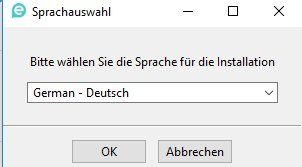
Willkommen..
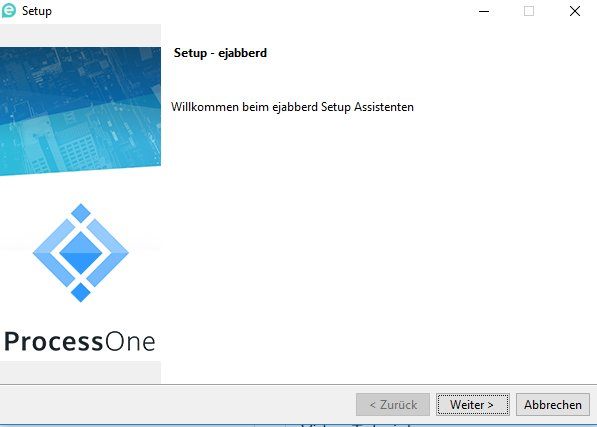
Bestätigen der Lizenzvereinbarung, auch wirklich durchlesen
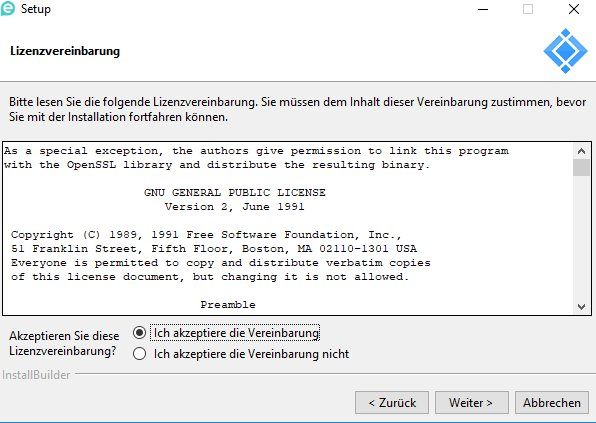
hier habe ich das Installationsverzeichnis in ejabberd abgeändert. Ist später für ein Update von Vorteil
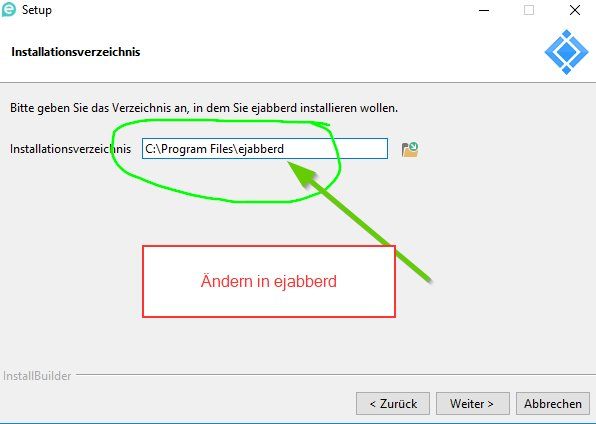
Eure Domäne
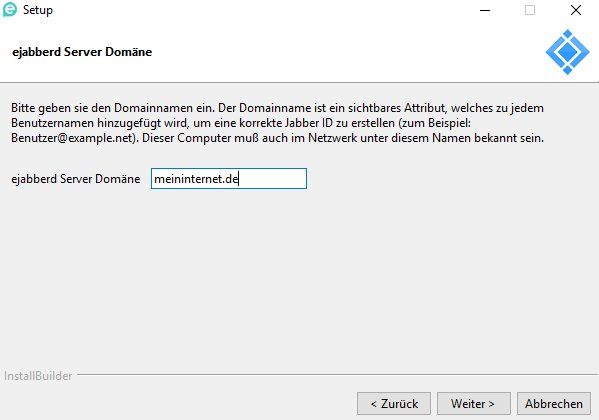
Der Administrator, wichtig ohne Domäne. Nur einfach admin
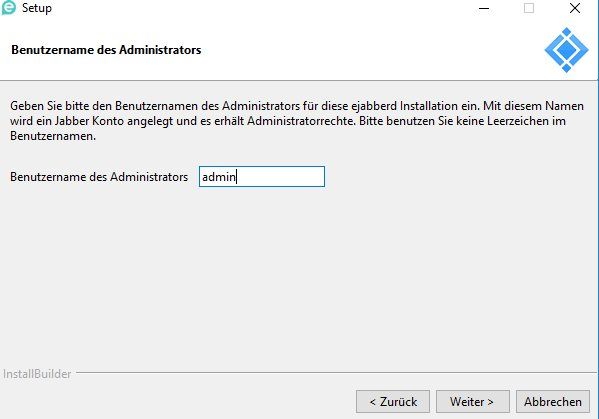
Das Passwort
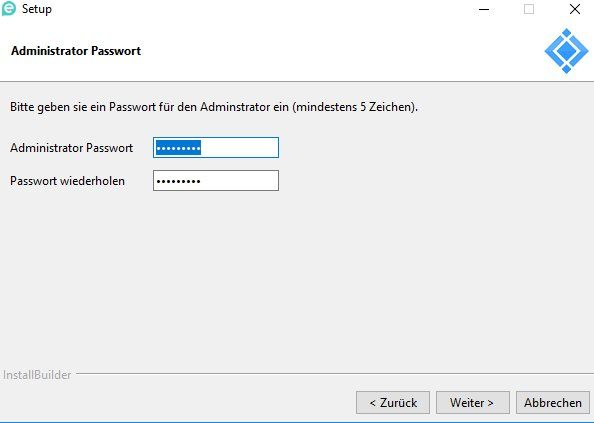
Cluster haben wir vermutlich nicht
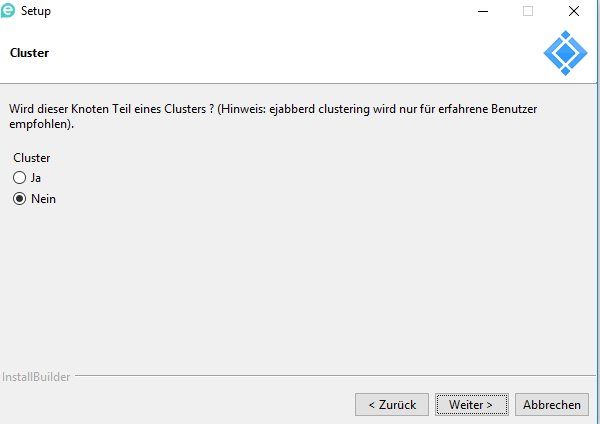
die Installation geht los
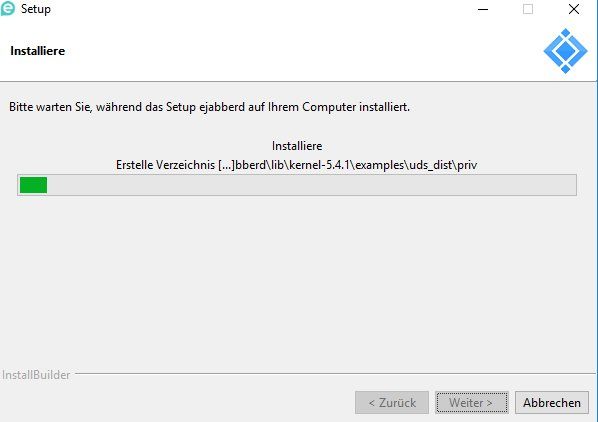
2 Abfragen von epmd.exe und erl.exe zur Freigabe für die Firewall
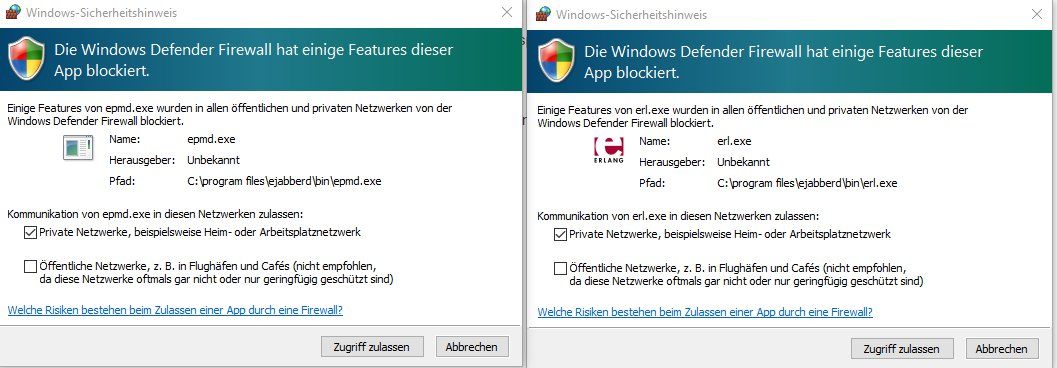
Abschluss
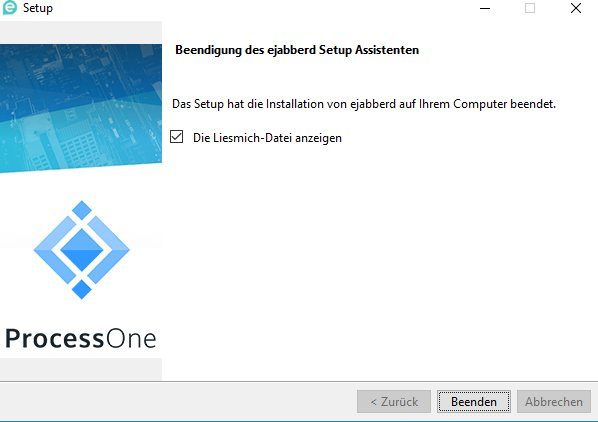
2 Verknüpfungen werden auf den Desktop angelegt.
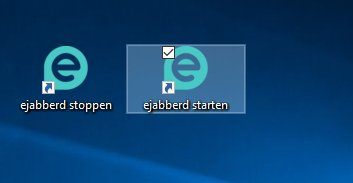
der Ejabberd Dienst sollte laufen, also prüfen

Anmeldungen an die Webverwaltung, hier local auf dem Server
http://localhost:5280/admin
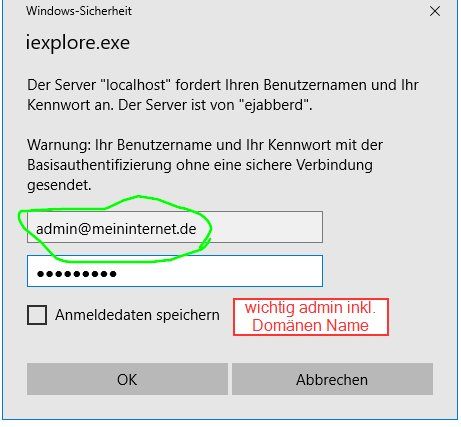
So sieht das dann aus

Anliegend eine kleine Anleitung inkl. Datei ejabberd.yml.
Wichtig: die Config Datei basiert auf der Installation von Ejabberd für Windows 18.04, in der yml Datei taucht daher der Installationspfad auf.
Unter C:\\ProgramData\\ejabberd\\conf werden die ejabberd.yml abgelegt.
Ejabberd, erzeugt gleich ein Zertifikat. Das Zertifikat würde ich aber z.B. durch ein Let's Encrypt Zertifkat ersetzen, sonst machen einige Messenger Probleme. Z.B. gajim.
C:\\ProgramData\\ejabberd\\conf\\server.pem
geöffnete Ports in der Hardware Firewall
5222 TCP die Anmeldung für die Xmpp Server
5444 TCP http upload
5269 TCP Kommunikation mit den anderen Servern
Hier stellt Ihr die Administratoren ein
admin:
user:
- "admin@meininternet.de"
- "Mustermann@meininternet.de"
Es wird die interne Datenbank genutzt, diese ist auf 2GB begrenzt
mnesia is limited to 2GB
Port Freigaben für die Windows Firewall werdet Ihr zu aufgefordert.
Aber zuerst installieren wir ejabberd:
Downloadlink, hier die Windows Version auswählen
Sprache

Willkommen..

Bestätigen der Lizenzvereinbarung, auch wirklich durchlesen

hier habe ich das Installationsverzeichnis in ejabberd abgeändert. Ist später für ein Update von Vorteil

Eure Domäne

Der Administrator, wichtig ohne Domäne. Nur einfach admin

Das Passwort

Cluster haben wir vermutlich nicht

die Installation geht los

2 Abfragen von epmd.exe und erl.exe zur Freigabe für die Firewall

Abschluss

2 Verknüpfungen werden auf den Desktop angelegt.

der Ejabberd Dienst sollte laufen, also prüfen

Anmeldungen an die Webverwaltung, hier local auf dem Server
http://localhost:5280/admin

So sieht das dann aus

###
###' ejabberd configuration file
###
###
### The parameters used in this configuration file are explained in more detail
### in the ejabberd Installation and Operation Guide.
### Please consult the Guide in case of doubts, it is included with
### your copy of ejabberd, and is also available online at
### http://www.process-one.net/en/ejabberd/docs/
### The configuration file is written in YAML.
### Refer to http://en.wikipedia.org/wiki/YAML for the brief description.
### However, ejabberd treats different literals as different types:
###
### - unquoted or single-quoted strings. They are called "atoms".
### Example: dog, 'Jupiter', '3.14159', YELLOW
###
### - numeric literals. Example: 3, -45.0, .0
###
### - quoted or folded strings.
### Examples of quoted string: "Lizzard", "orange".
### Example of folded string:
### > Art thou not Romeo,
### and a Montague?
###. =======
###' LOGGING
##
## loglevel: Verbosity of log files generated by ejabberd.
## 0: No ejabberd log at all (not recommended)
## 1: Critical
## 2: Error
## 3: Warning
## 4: Info
## 5: Debug
##
loglevel: 4
##
## rotation: Describe how to rotate logs. Either size and/or date can trigger
## log rotation. Setting count to N keeps N rotated logs. Setting count to 0
## does not disable rotation, it instead rotates the file and keeps no previous
## versions around. Setting size to X rotate log when it reaches X bytes.
## To disable rotation set the size to 0 and the date to ""
## Date syntax is taken from the syntax newsyslog uses in newsyslog.conf.
## Some examples:
## $D0 rotate every night at midnight
## $D23 rotate every day at 23:00 hr
## $W0D23 rotate every week on Sunday at 23:00 hr
## $W5D16 rotate every week on Friday at 16:00 hr
## $M1D0 rotate on the first day of every month at midnight
## $M5D6 rotate on every 5th day of the month at 6:00 hr
##
log_rotate_size: 10485760
log_rotate_date: ""
log_rotate_count: 1
##
## overload protection: If you want to limit the number of messages per second
## allowed from error_logger, which is a good idea if you want to avoid a flood
## of messages when system is overloaded, you can set a limit.
## 100 is ejabberd's default.
log_rate_limit: 100
##
## watchdog_admins: Only useful for developers: if an ejabberd process
## consumes a lot of memory, send live notifications to these XMPP
## accounts.
##
## watchdog_admins:
## - "admin@meininternet.de"
###. ===============
###' NODE PARAMETERS
##
## net_ticktime: Specifies net_kernel tick time in seconds. This options must have
## identical value on all nodes, and in most cases shouldn't be changed at all from
## default value.
##
## net_ticktime: 60
###. ================
###' SERVED HOSTNAMES
##
## hosts: Domains served by ejabberd.
## You can define one or several, for example:
## hosts:
## - "example.net"
## - "example.com"
## - "example.org"
##
hosts:
- "meininternet.de"
##
## route_subdomains: Delegate subdomains to other XMPP servers.
## For example, if this ejabberd serves example.org and you want
## to allow communication with an XMPP server called im.example.org.
##
## route_subdomains: s2s
###. ===============
###' LISTENING PORTS
## Define common macros used by listeners
define_macro:
'CERTFILE': "C:\\ProgramData\\ejabberd\\conf\\server.pem"
'CIPHERS': "ECDH:DH:!3DES:!aNULL:!eNULL:!MEDIUM@STRENGTH"
'TLSOPTS':
- "no_sslv2"
- "no_sslv3"
- "no_tlsv1"
- "no_tlsv1_1"
## - "cipher_server_preference"
## - "no_compression"
'DHFILE': "C:\\ProgramData\\ejabberd\\conf\\dhparams.pem" # generated with: openssl dhparam -out dhparams.pem 2048
##
## listen: The ports ejabberd will listen on, which service each is handled
## by and what options to start it with.
##
listen:
-
port: 5222
ip: "0.0.0.0"
module: ejabberd_c2s
## starttls: true
certfile: 'CERTFILE'
protocol_options: 'TLSOPTS'
dhfile: 'DHFILE'
ciphers: 'CIPHERS'
##
## To enforce TLS encryption for client connections,
## use this instead of the "starttls" option:
##
starttls_required: true
##
## Stream compression
##
## zlib: true
##
max_stanza_size: 65536
shaper: c2s_shaper
access: c2s
-
port: 5269
ip: "0.0.0.0"
module: ejabberd_s2s_in
max_stanza_size: 131072
shaper: s2s_shaper
-
port: 5280
module: ejabberd_http
request_handlers:
"/bosh": mod_bosh
web_admin: true
http_bind: true
tls: true
certfile: 'CERTFILE'
protocol_options: 'TLSOPTS'
dhfile: 'DHFILE'
ciphers: 'CIPHERS'
-
port: 5444
module: ejabberd_http
tls: true
certfile: 'CERTFILE'
request_handlers:
"upload": mod_http_upload
protocol_options: 'TLSOPTS'
dhfile: 'DHFILE'
ciphers: 'CIPHERS'
##
## ejabberd_service: Interact with external components (transports, ...)
##
## -
## port: 8888
## ip: "::"
## module: ejabberd_service
## access: all
## shaper_rule: fast
## ip: "127.0.0.1"
## privilege_access:
## roster: "both"
## message: "outgoing"
## presence: "roster"
## delegations:
## "urn:xmpp:mam:1":
## filtering: ["node"]
## "http://jabber.org/protocol/pubsub":
## filtering:
## hosts:
## "icq.example.org":
## password: "secret"
## "sms.example.org":
## password: "secret"
##
## ejabberd_stun: Handles STUN Binding requests
##
## -
## port: 3478
## transport: udp
## use_turn: true
## auth_type: user
## auth_realm: "meininternet.de"
## turn_ip: "192.65.178.65"
## module: ejabberd_stun
##
## To handle XML-RPC requests that provide admin credentials:
##
## -
## port: 4560
## ip: "::"
## module: ejabberd_xmlrpc
## maxsessions: 10
## timeout: 5000
## access_commands:
## admin:
## commands: all
## options:
##
## To enable secure http upload
##
## Disabling digest-md5 SASL authentication. digest-md5 requires plain-text
## password storage (see auth_password_format option).
## disable_sasl_mechanisms: "digest-md5"
###. ==================
###' S2S GLOBAL OPTIONS
##
## s2s_use_starttls: Enable STARTTLS for S2S connections.
## Allowed values are: false, optional or required
## You must specify a certificate file.
##
s2s_use_starttls: required
##
## s2s_certfile: Specify a certificate file.
##
s2s_certfile: 'CERTFILE'
s2s_protocol_options: 'TLSOPTS'
s2s_ciphers: 'CIPHERS'
s2s_dhfile: 'DHFILE'
## Custom OpenSSL options
##
## s2s_protocol_options: 'TLSOPTS'
##
## domain_certfile: Specify a different certificate for each served hostname.
##
## host_config:
## "example.org":
## domain_certfile: "C:\\ProgramData\\ejabberd\\conf\\example_org.pem"
## "example.com":
## domain_certfile: "C:\\ProgramData\\ejabberd\\conf\\example_com.pem"
##
## S2S whitelist or blacklist
##
## Default s2s policy for undefined hosts.
##
## s2s_access: s2s
##
## Outgoing S2S options
##
## Preferred address families (which to try first) and connect timeout
## in seconds.
##
## outgoing_s2s_families:
## - ipv4
## - ipv6
## outgoing_s2s_timeout: 190
###. ==============
###' AUTHENTICATION
##
## auth_method: Method used to authenticate the users.
## The default method is the internal.
## If you want to use a different method,
## comment this line and enable the correct ones.
##
auth_method: internal
##
## Store the plain passwords or hashed for SCRAM:
## auth_password_format: plain
auth_password_format: scram
##
## Define the FQDN if ejabberd doesn't detect it:
## fqdn: "server3.example.com"
##
## Authentication using external script
## Make sure the script is executable by ejabberd.
##
## auth_method: external
## extauth_program: "/path/to/authentication/script"
##
## Authentication using SQL
## Remember to setup a database in the next section.
##
## auth_method: sql
##
## Authentication using PAM
##
## auth_method: pam
## pam_service: "pamservicename"
##
## Authentication using LDAP
##
## auth_method: ldap
##
## List of LDAP servers:
## ldap_servers:
## - "localhost"
##
## Encryption of connection to LDAP servers:
## ldap_encrypt: none
## ldap_encrypt: tls
##
## Port to connect to on LDAP servers:
## ldap_port: 389
## ldap_port: 636
##
## LDAP manager:
## ldap_rootdn: "dc=example,dc=com"
##
## Password of LDAP manager:
## ldap_password: "******"
##
## Search base of LDAP directory:
## ldap_base: "dc=example,dc=com"
##
## LDAP attribute that holds user ID:
## ldap_uids:
## - "mail": "%u@mail.example.org"
##
## LDAP filter:
## ldap_filter: "(objectClass=shadowAccount)"
##
## Anonymous login support:
## auth_method: anonymous
## anonymous_protocol: sasl_anon | login_anon | both
## allow_multiple_connections: true | false
##
## host_config:
## "public.example.org":
## auth_method: anonymous
## allow_multiple_connections: false
## anonymous_protocol: sasl_anon
##
## To use both anonymous and internal authentication:
##
## host_config:
## "public.example.org":
## auth_method:
## - internal
## - anonymous
###. ==============
###' DATABASE SETUP
## ejabberd by default uses the internal Mnesia database,
## so you do not necessarily need this section.
## This section provides configuration examples in case
## you want to use other database backends.
## Please consult the ejabberd Guide for details on database creation.
##
## MySQL server:
##
## sql_type: mysql
## sql_server: "server"
## sql_database: "database"
## sql_username: "username"
## sql_password: "password"
##
## If you want to specify the port:
## sql_port: 1234
##
## PostgreSQL server:
##
## sql_type: pgsql
## sql_server: "server"
## sql_database: "database"
## sql_username: "username"
## sql_password: "password"
##
## If you want to specify the port:
## sql_port: 1234
##
## If you use PostgreSQL, have a large database, and need a
## faster but inexact replacement for "select count(*) from users"
##
## pgsql_users_number_estimate: true
##
## SQLite:
##
## sql_type: sqlite
## sql_database: "C:\\Program Files\\ejabberd-17.09\\database\\ejabberd.db"
##
## ODBC compatible or MSSQL server:
##
## sql_type: odbc
## sql_server: "DSN=ejabberd;UID=ejabberd;PWD=ejabberd"
##
## Number of connections to open to the database for each virtual host
##
## sql_pool_size: 10
##
## Interval to make a dummy SQL request to keep the connections to the
## database alive. Specify in seconds: for example 28800 means 8 hours
##
## sql_keepalive_interval: undefined
###. ===============
###' TRAFFIC SHAPERS
shaper:
##
## The "normal" shaper limits traffic speed to 1000 B/s
##
normal: 1000
##
## The "fast" shaper limits traffic speed to 50000 B/s
##
fast: 50000
##
## This option specifies the maximum number of elements in the queue
## of the FSM. Refer to the documentation for details.
##
max_fsm_queue: 1000
###. ====================
###' ACCESS CONTROL LISTS
acl:
##
## The 'admin' ACL grants administrative privileges to XMPP accounts.
## You can put here as many accounts as you want.
##
admin:
user:
- "admin@meininternet.de"
- "Mustermann@meininternet.de"
##
## Blocked users
##
## blocked:
## user:
## - "baduser@example.org"
## - "test"
## Local users: don't modify this.
##
local:
user_regexp: ""
##
## More examples of ACLs
##
## jabberorg:
## server:
## - "jabber.org"
## aleksey:
## user:
## - "aleksey@jabber.ru"
## test:
## user_regexp: "^test"
## user_glob: "test*"
##
## Loopback network
##
loopback:
ip:
- "127.0.0.0/8"
- "::1/128"
- "::FFFF:127.0.0.1/128"
##
## Bad XMPP servers
##
## bad_servers:
## server:
## - "xmpp.zombie.org"
## - "xmpp.spam.com"
##
## Define specific ACLs in a virtual host.
##
## host_config:
## "localhost":
## acl:
## admin:
## user:
## - "bob-local@localhost"
###. ============
###' SHAPER RULES
shaper_rules:
## Maximum number of simultaneous sessions allowed for a single user:
max_user_sessions: 10
## Maximum number of offline messages that users can have:
max_user_offline_messages:
- 5000: admin
- 100
## For C2S connections, all users except admins use the "normal" shaper
c2s_shaper:
- none: admin
- normal
## All S2S connections use the "fast" shaper
s2s_shaper: fast
###. ============
###' ACCESS RULES
access_rules:
## This rule allows access only for local users:
local:
- allow: local
## Only non-blocked users can use c2s connections:
c2s:
- deny: blocked
- allow
## Only admins can send announcement messages:
announce:
- allow: admin
## Only admins can use the configuration interface:
configure:
- allow: admin
## Only accounts of the local ejabberd server can create rooms:
muc_create:
- allow: local
## Only accounts on the local ejabberd server can create Pubsub nodes:
pubsub_createnode:
- allow: local
## In-band registration allows registration of any possible username.
## To disable in-band registration, replace 'allow' with 'deny'.
register:
- allow
## Only allow to register from localhost
trusted_network:
- allow: loopback
## Do not establish S2S connections with bad servers
## If you enable this you also have to uncomment "s2s_access: s2s"
## s2s:
## - deny:
## - ip: "XXX.XXX.XXX.XXX/32"
## - deny:
## - ip: "XXX.XXX.XXX.XXX/32"
## - allow
## ===============
## API PERMISSIONS
## ===============
##
## This section allows you to define who and using what method
## can execute commands offered by ejabberd.
##
## By default "console commands" section allow executing all commands
## issued using ejabberdctl command, and "admin access" section allows
## users in admin acl that connect from 127.0.0.1 to execute all
## commands except start and stop with any available access method
## (ejabberdctl, http-api, xmlrpc depending what is enabled on server).
##
## If you remove "console commands" there will be one added by
## default allowing executing all commands, but if you just change
## permissions in it, version from config file will be used instead
## of default one.
##
api_permissions:
"console commands":
from:
- ejabberd_ctl
who: all
what: "*"
"admin access":
who:
- access:
- allow:
- acl: loopback
- acl: admin
- oauth:
- scope: "ejabberd:admin"
- access:
- allow:
- acl: loopback
- acl: admin
what:
- "*"
- "!stop"
- "!start"
"public commands":
who:
- ip: "127.0.0.1/8"
what:
- "status"
- "connected_users_number"
## By default the frequency of account registrations from the same IP
## is limited to 1 account every 10 minutes. To disable, specify: infinity
## registration_timeout: 600
##
## Define specific Access Rules in a virtual host.
##
## host_config:
## "localhost":
## access:
## c2s:
## - allow: admin
## - deny
## register:
## - deny
###. ================
###' DEFAULT LANGUAGE
##
## language: Default language used for server messages.
##
language: "en"
##
## Set a different default language in a virtual host.
##
## host_config:
## "localhost":
## language: "ru"
###. =======
###' CAPTCHA
##
## Full path to a script that generates the image.
##
## captcha_cmd: "C:\\Program Files\\ejabberd-17.09\\lib\\ejabberd-17.09\\priv\\bin\\captcha.sh"
##
## Host for the URL and port where ejabberd listens for CAPTCHA requests.
##
## captcha_host: "meininternet.de:5280"
##
## Limit CAPTCHA calls per minute for JID/IP to avoid DoS.
##
## captcha_limit: 5
###. =======
###' MODULES
##
## Modules enabled in all ejabberd virtual hosts.
##
modules:
mod_adhoc: {}
mod_admin_extra: {}
mod_announce: # recommends mod_adhoc
access: announce
mod_blocking: {} # requires mod_privacy
mod_caps: {}
mod_carboncopy: {}
mod_client_state: {}
mod_configure: {} # requires mod_adhoc
## mod_delegation: {} # for xep0356
mod_disco: {}
## mod_echo: {}
## mod_irc: {}
mod_bosh: {}
## mod_http_fileserver:
## docroot: "/var/www"
## accesslog: "C:\\Program Files\\ejabberd-17.09\\logs\\access.log"
mod_http_upload:
docroot: "/ejabberd/upload"
put_url: "https://@HOST@:5444/upload"
access: local
mod_http_upload_quota:
max_days: 30
## mod_http_upload:
## # docroot: "@HOME@/upload"
## put_url: "https://@HOST@:5444"
## thumbnail: false # otherwise needs the identify command from ImageMagick installed
mod_last: {}
## XEP-0313: Message Archive Management
## You might want to setup a SQL backend for MAM because the mnesia database is
## limited to 2GB which might be exceeded on large servers
## mod_mam: {} # for xep0313, mnesia is limited to 2GB, better use an SQL backend
mod_mam:
use_cache: true
db_type: mnesia
default: always
mod_muc:
host: "conference.@HOST@"
access:
- allow
access_admin:
- allow: admin
access_create: muc_create
access_persistent: muc_create
max_user_conferences: 100
default_room_options:
mam: true
persistent: false
mod_muc_admin: {}
mod_muc_log: {}
mod_multicast: {}
mod_offline:
access_max_user_messages: max_user_offline_messages
mod_ping: {}
mod_pres_counter:
count: 5
interval: 60
mod_privacy: {}
mod_private: {}
mod_proxy65: {}
mod_pubsub:
access_createnode: pubsub_createnode
## reduces resource comsumption, but XEP incompliant
ignore_pep_from_offline: true
## XEP compliant, but increases resource comsumption
## ignore_pep_from_offline: false
last_item_cache: false
plugins:
- "flat"
- "pep" # pep requires mod_caps
mod_push:
include_body: "New message"
mod_push_keepalive: {}
mod_register:
##
## Protect In-Band account registrations with CAPTCHA.
##
## captcha_protected: true
##
## Set the minimum informational entropy for passwords.
##
## password_strength: 32
##
## After successful registration, the user receives
## a message with this subject and body.
##
welcome_message:
subject: "Welcome!"
body: |-
Hi.
Welcome to this XMPP server.
##
## When a user registers, send a notification to
## these XMPP accounts.
##
## registration_watchers:
## - "admin1@example.org"
##
## Only clients in the server machine can register accounts
##
ip_access: trusted_network
##
## Local c2s or remote s2s users cannot register accounts
##
## access_from: deny
access: register
mod_roster:
versioning: true
store_current_id: false
mod_shared_roster: {}
mod_stats: {}
mod_time: {}
mod_vcard:
search: false
mod_vcard_xupdate: {}
## Convert all avatars posted by Android clients from WebP to JPEG
mod_avatar:
convert:
webp: jpeg
mod_version: {}
mod_stream_mgmt: {}
## Non-SASL Authentication (XEP-0078) is now disabled by default
## because it's obsoleted and is used mostly by abandoned
## client software
## mod_legacy_auth: {}
## The module for S2S dialback (XEP-0220). Please note that you cannot
## rely solely on dialback if you want to federate with other servers,
## because a lot of servers have dialback disabled and instead rely on
## PKIX authentication. Make sure you have proper certificates installed
## and check your accessibility at https://xmpp.net/
mod_s2s_dialback: {}
mod_http_api: {}
##
## Enable modules with custom options in a specific virtual host
##
## host_config:
## "localhost":
## modules:
## mod_echo:
## host: "mirror.localhost"
##
## Enable modules management via ejabberdctl for installation and
## uninstallation of public/private contributed modules
## (enabled by default)
##
allow_contrib_modules: true
###.
###'
### Local Variables:
### mode: yaml
### End:
### vim: set filetype=yaml tabstop=8 foldmarker=###',###. foldmethod=marker: Bitte markiere auch die Kommentare, die zur Lösung des Beitrags beigetragen haben
Content-ID: 356539
Url: https://administrator.de/tutorial/xmpp-server-ejabberd-18-04-auf-windows-356539.html
Ausgedruckt am: 13.07.2025 um 23:07 Uhr